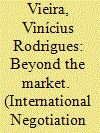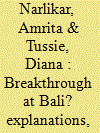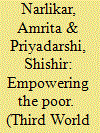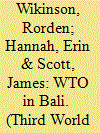| Srl | Item |
| 1 |
ID:
146455


|
|
|
|
|
| Summary/Abstract |
Negotiators expect the World Trade Organization (WTO) to be an arena for states to pursue their material gain. However, the WTO also reflects symbolic aspects of international politics, in particular the notion of multilateralism. Although such a principle, in part, expresses Western dominance, Global South states have also benefited from multilateral regimes, and thus have incentives to legitimize them and behave according to their rules. Will the pattern of multilateralism change as other trade arrangements potentially gain more prominence? This article analyzes actions taken by Brazil and India in WTO’s Doha Development Agenda (DDA) and concludes that the multilateral system of trade will survive as Global South states participate in the organization to seek not just material gains but also to commit themselves to the international normative dimension.
|
|
|
|
|
|
|
|
|
|
|
|
|
|
|
|
| 2 |
ID:
146453


|
|
|
|
|
| Summary/Abstract |
The World Trade Organization’s (WTO) Ministerial Conference at Bali in December 2013 seemed to have marked a landmark moment in the history of the negotiations of the Doha Development Agenda (DDA). This article begins with a brief analysis of why the DDA has been quagmired in deadlocks and become the longest running trade round in the history of the multilateral trading system. It then discusses the significance of what was achieved at the Bali Ministerial in light of repeated failures and particularly from the perspective of the world’s poorest countries. It explains why and how breakthroughs were achieved and highlights several important institutional innovations. Lastly, it discusses how sustainable these innovations might be.
|
|
|
|
|
|
|
|
|
|
|
|
|
|
|
|
| 3 |
ID:
135057


|
|
|
|
|
| Summary/Abstract |
After over a decade of languishing in stalemate, the Doha Development Agenda – the first round of trade negotiations launched under the auspices of the World Trade Organization – finally achieved a breakthrough at the Bali ministerial in 2013. Given that the Doha mandate places development – and particularly the concerns of the Least Developed Countries (ldcs) – at the heart of its agenda, our paper focuses on what the Bali outcome means for the world’s poorest countries. As a first step we provide a brief background against which the Bali negotiations took place. In the second section we assess the achievements and limitations of the Bali outcome, focusing on the ldc-specific package and also commenting on other issues that affect the ldcs. In the third section we explain the reasons for some of the achievements at Bali, which include negotiating strategies used by the ldcs themselves. In the fourth and final section we identify a plan of action for the future.
|
|
|
|
|
|
|
|
|
|
|
|
|
|
|
|
| 4 |
ID:
135058


|
|
|
|
|
| Summary/Abstract |
Despite its growing status as an ‘emerging’ power, perceptions of India’s current and future role in multilateral organisations continue to be overshadowed by its reputation for blocking rather than supporting progress in multilateral negotiations on grounds of national sovereignty and Third Worldism. In this article we suggest a more positive interpretation of India’s role through a close analysis of its diplomacy during the 2001 Doha Ministerial Conference of the World Trade Organisation (wto). The Indian delegation attempted proactively to shape the agenda of the negotiations and to promote a form of developmental multilateralism that might correct the perceived imbalances within the substantive commitments to and structure and processes of the wto. India failed to get its way at the time, but the ongoing deadlock at Doha demonstrates the continuing salience of such alternative conceptions of global justice.
|
|
|
|
|
|
|
|
|
|
|
|
|
|
|
|
| 5 |
ID:
135056


|
|
|
|
|
| Summary/Abstract |
The conclusion of the World Trade Organization’s (wto) ninth ministerial meeting – held in Bali 3–7 December 2013 – is at one and the same time momentous, marginal and business-as-usual. It is momentous because it marks the first multilateral agreement reached in the wto since the organisation began operations on 1 January 1995; it is marginal because the deal reached will have only a limited impact on the global trading system; and it is business as usual because the Bali package will be of disproportionally greater value to the industrial states than to their developing and least developed counterparts. We examine what happened in Bali, covering the principal issues at stake and the content of the outcome, what this means for the wto and for the Doha Development Agenda (dda), and why it all matters. We argue that, while the Bali ministerial is significant and the agreements reached important, the conclusion of the meeting and the package agreed represent only a limited movement forward in addressing the fundamental problems and inequities of the wto system.
|
|
|
|
|
|
|
|
|
|
|
|
|
|
|
|